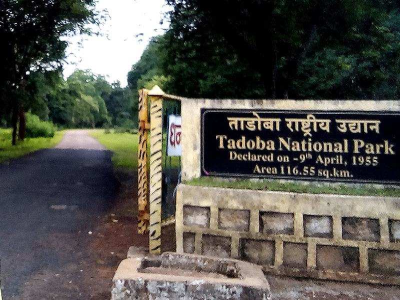- News
- City News
- nagpur News
- High court slams government over relocation of Nagpur villages, other issues at Tadoba
High court slams government over relocation of Nagpur villages, other issues at Tadoba

Tadoba National Park
NAGPUR: Expressing concern over various issues pertaining to Tadoba Andhari Tiger Reserve (TATR) like relocation of villagers from protected areas and vacancies for post of forest officials, the Nagpur bench of Bombay High Court on Wednesday slammed the Maharashtra government for not taking steps since 2009 when a suo motu PIL was filed to address these issues.
While hearing the case that came up for hearing after 12 years, a division bench comprising justices Sunil Shukre and Anil Kilor directed the government to file a comprehensive reply on a variety of issues raised in the petition within two weeks.
The HC had taken suo motu cognizance of TOI reports on pitiable conditions in TATR due to vacancies that had led to its closure in November 2008.
Senior counsel Chandrashekhar Kaptan was amicus curiae to plead the case. On September 9, 2009, he had sought directives to the respondents to produce on record a tiger conservation plan tripartite agreement entered with the National Tiger Conservation Authority (NTCA).
Then government pleader Nitin Sambre (Now HC judge) had assured to provide copies of both documents within two weeks. The government has failed to submit both documents.
“The petition opens various issues related to preservation and conservation of precious forest areas in Maharashtra, a majority of which are located in Vidarbha, particularly in TATR in Chandrapur. The famous park frequented by the tourists was suddenly closed down in 2008 due to non-availability of forest officials. The decision was shocking and spoke volumes about the non-performance and negligence of the government, which was its constitution duty,” the bench said.
While listing out several issues for conservation of the wildlife parks, the judges asked the government to undertake work of relocation and rehabilitation of villages from the protected areas on priority. “Out of many issues mentioned in the PIL, hardly few were addressed by the government. A majority of them still linger on since 2009. The perusal of recent orders indicates that the focus of HC is on relocation and rehabilitation of forest dwellers residing in the TATR’s protected areas,” the judges said.
Citing the Wildlife Protection Act, 1972 and ‘Scheduled Tribes and Other Traditional Forest Dwellers (Recognition of Forest Rights) Act, 2006’, the judges said both are two distinct methods to resettle the dwellers and it’s up to the government to choose the way by which it would perform its statutory duty. “It appears that the provisions of the Wildlife Act stand in the way of relocating the villages to other areas. There is a need to explore provisions of both Acts. We direct the government to apply its mind and come out with a solution. It would be necessary for it to file a reply on specific issues,” the judges said.
While hearing the case that came up for hearing after 12 years, a division bench comprising justices Sunil Shukre and Anil Kilor directed the government to file a comprehensive reply on a variety of issues raised in the petition within two weeks.
The HC had taken suo motu cognizance of TOI reports on pitiable conditions in TATR due to vacancies that had led to its closure in November 2008.
Senior counsel Chandrashekhar Kaptan was amicus curiae to plead the case. On September 9, 2009, he had sought directives to the respondents to produce on record a tiger conservation plan tripartite agreement entered with the National Tiger Conservation Authority (NTCA).
Then government pleader Nitin Sambre (Now HC judge) had assured to provide copies of both documents within two weeks. The government has failed to submit both documents.
“The petition opens various issues related to preservation and conservation of precious forest areas in Maharashtra, a majority of which are located in Vidarbha, particularly in TATR in Chandrapur. The famous park frequented by the tourists was suddenly closed down in 2008 due to non-availability of forest officials. The decision was shocking and spoke volumes about the non-performance and negligence of the government, which was its constitution duty,” the bench said.
While listing out several issues for conservation of the wildlife parks, the judges asked the government to undertake work of relocation and rehabilitation of villages from the protected areas on priority. “Out of many issues mentioned in the PIL, hardly few were addressed by the government. A majority of them still linger on since 2009. The perusal of recent orders indicates that the focus of HC is on relocation and rehabilitation of forest dwellers residing in the TATR’s protected areas,” the judges said.
Citing the Wildlife Protection Act, 1972 and ‘Scheduled Tribes and Other Traditional Forest Dwellers (Recognition of Forest Rights) Act, 2006’, the judges said both are two distinct methods to resettle the dwellers and it’s up to the government to choose the way by which it would perform its statutory duty. “It appears that the provisions of the Wildlife Act stand in the way of relocating the villages to other areas. There is a need to explore provisions of both Acts. We direct the government to apply its mind and come out with a solution. It would be necessary for it to file a reply on specific issues,” the judges said.
FacebookTwitterLinkedinEMail
Start a Conversation
end of article
Quick Links
Delhi Air PollutionDelhi TemperatureChennai WeatherBangalore TemperatureCovid vaccination centres in DelhiCoronavirus in DelhiRTPCR test in GurgaonHyderabad RainPollution level in BangaloreDelhi SmogDelhi TemperatureNoida AQIGurgaon AQI todayFire in MumbaiMumbai RainsCovid 19 RT PCR Test in NoidaDelhi AQI todaySrinagar encounter
